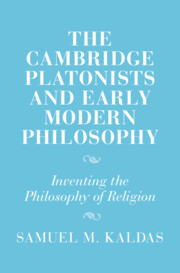Book contents
- The Cambridge Platonists and Early Modern Philosophy
- Cambridge Studies in Religion and Platonism
- The Cambridge Platonists and Early Modern Philosophy
- Copyright page
- Dedication
- Contents
- Acknowledgements
- Note on the Text
- Abbreviations
- Introduction: The Cambridge Platonists and Philosophy of Religion
- Part I The Origins of Cambridge Platonism
- Part II Rival Conceptions of God and Goodness:
- Part III The Religious Epistemology of the Cambridge Platonists
- 8 Reason and the Mind of God:
- 9 Deification as Spiritual Sensation:
- 10 Liberty, Violence and Practical Reason:
- Conclusion: The Cambridge Platonists as Early Modern Christian Platonists
- References
- Index
9 - Deification as Spiritual Sensation:
The Epistemology of Religious Experience
from Part III - The Religious Epistemology of the Cambridge Platonists
Published online by Cambridge University Press: 09 May 2024
- The Cambridge Platonists and Early Modern Philosophy
- Cambridge Studies in Religion and Platonism
- The Cambridge Platonists and Early Modern Philosophy
- Copyright page
- Dedication
- Contents
- Acknowledgements
- Note on the Text
- Abbreviations
- Introduction: The Cambridge Platonists and Philosophy of Religion
- Part I The Origins of Cambridge Platonism
- Part II Rival Conceptions of God and Goodness:
- Part III The Religious Epistemology of the Cambridge Platonists
- 8 Reason and the Mind of God:
- 9 Deification as Spiritual Sensation:
- 10 Liberty, Violence and Practical Reason:
- Conclusion: The Cambridge Platonists as Early Modern Christian Platonists
- References
- Index
Summary
This chapter further explores the Cambridge Platonists’ religious epistemology by examining their theory of spiritual sensation, a striking fusion of early modern sense theory, early Christian notions of deification, Puritan spirituality, and Platonic metaphysics. The Cambridge Platonists hold that when a soul becomes deified through the practice of virtue, God comes to dwell in it, and that as a result, the soul becomes able to know God directly by looking inward. This knowledge is the fruit of direct, perceptual contact with God, granting it a phenomenal quality that cannot be attained by mere descriptions of God. Conversely though, when a soul marred with vices looks inward in the attempt to know God, it inevitably forms a distorted picture of God that reflects its own moral flaws. Thus, the Cambridge Platonists’ theory of spiritual sensation undergirds their rejection of Calvinist doctrine, providing them with a sort of ‘error theory’ to explain how their theological opponents arrived at the views they did.
Keywords
- Type
- Chapter
- Information
- The Cambridge Platonists and Early Modern PhilosophyInventing the Philosophy of Religion, pp. 237 - 268Publisher: Cambridge University PressPrint publication year: 2024

